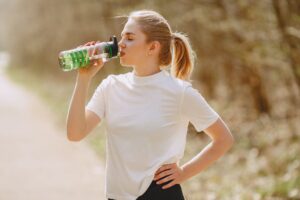Before an exercise, it is essential to provide your body with the proper nutrients for optimal performance and energy levels. There are numerous foods that can enhance your exercise routine, but there are some workout foods you should avoid. Consuming the incorrect foods prior to exercise can cause discomfort, lethargy, and even digestive issues. In this blog post, we’ll investigate the ten foods you should steer clear of before visiting the gym or engaging in any physical activity.
1. Fiber-Rich Foods
High-fiber foods, such as legumes, lentils, and bran cereals, should not be consumed immediately before exercise. These foods can cause flatulence, bloating, and gastrointestinal discomfort, making exercise uncomfortable and distracting.
2. High-Fat Foods
Fatty foods, particularly those rich in saturated fats, take longer to metabolize and can cause fatigue during exercise. Avoid weighty, sluggish foods such as breaded poultry, pizza, and hamburgers.
3. Hot Foods
While delectable, spicy foods can cause digestive issues and indigestion during exercise. Foods containing an excessive amount of seasonings or spicy condiments can cause discomfort and hinder performance.

4. Carbonated Beverages
Due to the carbonation, carbonated beverages such as soda and effervescent water can induce bloating and flatulence. Additionally, they can increase the risk of acid reflux, making them poor choices before exercise.
5. Sugar-Rich Foods
While sweetened munchies and chocolates may provide a short-term energy surge, they can quickly lead to a collapse. During your exercise, these rapid surges and dips in blood sugar can leave you feeling fatigued and irritable.
6. Milk and Dairy Products
Some individuals may have difficulty digesting dairy products such as milk, yoghurt, and cheese, leading to gastrointestinal discomfort and possible cramping during exercise. Avoid dairy before exercise if you have lactose intolerance or sensitivity.
7. Fried and Oily Foods
French fries and potato snacks are high in harmful lipids and can be difficult on the digestive system. Additionally, they can cause reflux and dyspepsia, diminishing the enjoyment of your workout.
8. Sizeable Meals
A large, weighty supper consumed immediately before exercise can cause discomfort and lethargy. Your body needs time to correctly metabolize a substantial meal. It is ideal to consume a modest, well-balanced nibble or supper approximately one to two hours prior to exercise.

9. Refined Foods
Processed foods, including packaged munchies, fast food, and sweetened cereals, typically contain a high amount of additives, preservatives, and artificial ingredients. These can cause digestive distress and contain little nutritional value.
10. Alcoholic beverages
Alcohol dehydrates the body, impairs coordination, and impacts overall performance during assessment. To remain adequately hydrated and focused, it is best to avoid alcohol before exercising.
What to Eat Rather?
Now that we’ve discussed the foods to avoid, let’s examine some superior pre-workout fuel options:
- Complex Carbohydrates: Muesli, whole-grain bread, and brown rice are examples of foods that provide a constant supply of energy and help sustain your exercise.
- Lean Proteins: For muscle repair and growth, choose protein sources such as chicken, turkey, tofu, and legumes.
- Nuts and Seeds: A fistful of nuts or seeds can provide a combination of healthful lipids, protein, and nutrients that enhance energy.
- Low-Fat Dairy or Dairy Substitutes: If you tolerate dairy well, consider Greek yogurt or almond milk to increase your protein and calcium intake.
- Hydration: Don’t neglect to consume a lot of water prior to your workout in order to remain hydrated and maintain peak performance.

Conclusion
The foods you choose to consume before a workout can significantly impact your exercise experience. Avoiding foods that can cause discomfort, congestion, and lethargy is crucial for a productive workout. Instead, choose nutrient-dense, readily digestible foods that support your fitness objectives and provide sustained energy.
Remember that individual tolerance to certain foods can vary, so observe how your body reacts and adjust your pre-workout sustenance accordingly. By making informed decisions, you can ensure that your body is adequately fueled and prepared to perform at its peak level during exercise.
- What’s your favourite pre-workout meal?
If you enjoyed this blog post, share it with your friends!
